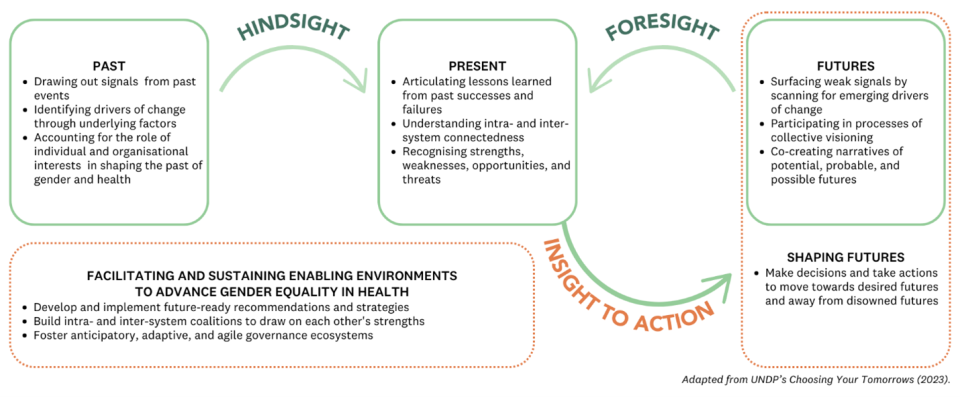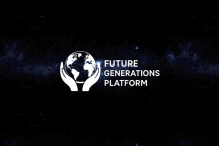In a world grappling with poly- and perma-crises, traditional approaches to policy- and decision-making are challenged by the pace of change and degree of iteration required to respond to increasingly complex challenges. As a UN think tank with the mandate to generate policy-relevant research and advocate for its translation into evidence-informed health decision-making, UNU-IIGH continues to grapple with the mismatch between what has served our needs in the past and what is fit to transport us from our dynamic and interconnected present towards desired and equitable futures.
Futures-orientated thinking, methodologies, and practices are powerful tools for addressing the limitations of traditional policy- and decision-making processes. Encompassing a wide range of approaches, futures and foresight can facilitate what UNDP refers to as “Triple A Governance”: anticipatory, agile, and adaptive governance which “allows for governments to respond to challenges with precision and speed and creates an enabling environment for innovative solutions”
In 2019, UNU-IIGH first embarked on a journey to better understand foresight and its applicability to health. In this five-year retrospective, we share some of the lessons we’ve learned and promising practices from our deep dive into futures thinking and strategic foresight for health.
Drawing on our review of the literature, we formulated three recommendations for UNU-IIGH to apply foresight to our work:
- Cultivate ‘pracademics’ by developing a foundation of theoretical knowledge and practical experience.
- Implement critically by interrogating the epistemic roots of foresight and acknowledging both its benefits and its limitations.
- Adopt a ‘jigsaw puzzle’ approach by integrating foresight as one of many interlocking pieces in the global health toolkit.
In the five years since, we have consciously designed our practical explorations and applications of foresight to centre some combination of, if not all three, recommendations. Our first foray was a workshop co-hosted with the Malaysian Ministry of Heath (MoH), the Malaysian Industry-Government Group for High Technology and both national and regional WHO teams, which was based on a ‘learning by doing’ approach. Designed to contribute to the development of an updated MoH strategy, policymakers from across the civil service took part in a series of exercises incorporating a number of foresight tools.
In a more recent iteration of our approach to foresight, we have centred decolonial and feminist theory in adapting foresight tools to align with values of inclusion and equity. Using decolonial feminism as an entry point into interrogations of power, we address the roots of foresight in the Western military-industrial complex through a process of active and critical adaptation as opposed to passive adoption. Building on the work of decolonial and feminist futurists, we have adapted foresight for use in collaborative settings with youth-led feminist activists and in a three-day workshop that brought together academics, activists, funders, policy-makers, and health-adjacent actors.

Finally, the effort to integrate foresight into a “jigsaw puzzle” approach remains an ongoing journey both for us at UNU-IIGH and across the UN ecosystem more broadly. Foresight, as part of the ‘Quintet of Change’ to achieve UN2.0 and deliver on the recommendations presented in the Secretary-General’s ‘Our Common Agenda’ report, will be on full display at this September’s Summit of the Future. As we go into the final negotiations of the Pact for the Future and the Declaration on Future Generations where those Declaration on Future Generations, global health actors looking for longer-term strategies and solutions will have an opportunity to feed into action points on sustainable development and funding for development; international peace and security; science, technology, and innovation and digital cooperation; youth and future generations; and transforming global governance.
We continue to benefit from shared learnings and look forward to collectively iterating our approaches to futures thinking and strategic foresight in global health alongside our peers across the global health ecosystem, the futures field, and beyond. If you are interested in learning more about UNU-IIGH's work on futures thinking or exploring possibilities for collaboration, please contact us at:
- Emma Rhule: rhule@unu.edu
- Tiffany Nassiri-Ansari: nassiri@unu.edu

